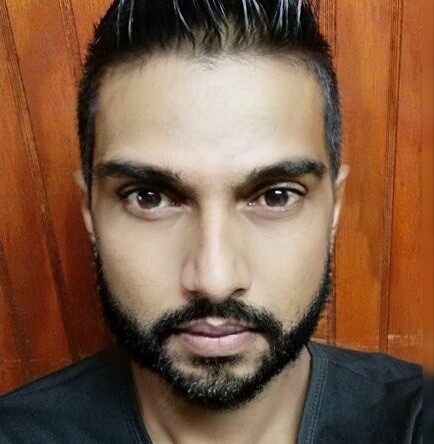 |
|

The influx of indentured labourers in Trinidad spanned for a period of more than seventy years, beginning around 1845 - with the first batch coming aboard the historic Fatal Razack - and ending around 1917. These labourers from India brought not only their families and their jhaji bundles, but also their very souls: their culture, their heritage, their beliefs – all of which have been passed on from generation to generation and continue to be an important facet of the cultural setting of the island post-indentureship.
Makh Ticklal has faint memories of his Aja and Ajee (respectively grandfather and grandmother from one’s father’s side) who would have come to Trinidad in search of a better life as indentured labourers. Though Makh’s memory of them is nothing but a sweet, distant dream laid to rest, their legacy lives on in the pottery shop located at Ghany Street in Chaguanas.

Moulding deeyas out of clay is one of the many cultural structures brought by our Indian forefathers to Trinidad as it was necessary to fulfil and practise their Hindu religious principles. Passing through generations, for the Ticklals it is Makh’s responsibility to maintain and uphold the tradition of moulding deeyas, as the ritual has now hereditably settled with him.
Makh remembers helping his mother and father, from the very young age of six, to make deeyas during Divali time. But what was merely a religious functionality to the original Ticklals was transformed into a business by Makh’s parents – Jutram and Prema Ticklal - and today stands as the main avenue from which the family earns an income.
Upon entering the establishment, the earthiness and nature of their work is revealed with the hundreds of deeyas bathing in the heat of the sun in the family’s front yard. But the couple hundreds drying at the front are nothing compared with what’s inside. There are shelves and piles of deeyas stored all over the miniature factory as they strive to ensure that supply meets demand for the busy Divali season.
The business is run by Makh and his wife, Stacy (as sadly both of Makh’s parents have passed away, but are remembered by the banner devotedly pinned on the wall behind his work station). The couple work together in moulding and selling the pottery. Makh is now 31 and a proud father of two young children (who spend part of their days dirtying their hands in the clay for fun while their parents work).

Deeyas laying on oven, used when it's raining
Though his success and management of the establishment is commendable, Makh didn’t always dream of carrying on the family business. He avowals his double-award in Agricultural Science at CXC Level which enabled him to begin to pursue his dreams at Eastern Caribbean Institute of Agriculture and Forestry (ECIAF) where he was studying to become a Forest Ranger. However, in the midst of his studies, at his pre-virile age of eighteen, his father lost his sight to cataract forcing Makh to abandon his studies and start working full-time in the family business.

Freshly made incense holders - straight off the potter's wheel
While teenaged Makh would have dreamt of becoming a Forest Ranger, today a more mature Makh speaks passionately of carrying forward the chromosomal pottery business which has now been existence for a total of seventy years. He brags about diversifying the business by moving away from only making deeyas. When asked what is made today at the business place called Makh’s Pottery Shop, the proud proprietor pontificates, “Anything yuh want- clay pots for plants, incense holders, water fountains – anything yuh want!”
And it is true. You really can get anything you want out of clay at Makh’s! Whilst observing a well-detailed hut made entirely out of clay that the average person would probably have to attend ‘a couple classes well’ to learn how to produce (but in this instance, innately made by Makh), a man enters zealously with a problem. His daughter has a school assignment to make a chulha (dirt oven). Makh contemplatively and scientifically informs the man of the amount of clay he needs and the process of making and drying the chulha – advice that a University graduate may not be able to give.

Pugmill used to knead clay
Throughout the year, Makh spends most of his time making plant pots and other practical pottery items for households. His focus for Divali is religious items such as deeyas, incense holders, clay lotas – and he even indulges his creativity further by making waxed deeyas and painted deeyas (though these are not as popular as the plain, traditional deeyas that require wicks and coconut oil to be lit). There is not a moment to spare as Makh spends almost our entire time together behind his potter’s wheel, and divulges information on the art of pottery making.
The clay, which is dug by tractors from his own land in Carlsen Field, is brought to his back-shed and soaked overnight in water. The clay is then sorted into soft clay and hard clay. The soft clay is placed in a pugmill to knead while the hard clay is re-soaked for a few hours to soften. After the soft clay is kneaded, Makh portions it into manageable moulds to craft on his potter’s wheel. Today, Makh has the luxury of using an electric wheel which he himself made. He remembers the early days when a wheel made out stone had a thick piece of wood stuck in between and required two persons to operate – one turning the wheel with the stick whilst the other was forming the clay: a very gruelling procedure. He says work became slightly easier when a handle was devised for the potter’s wheel, allowing one person to handle it. Today, an electric motor has been connected to operate the wheel by the flick of a switch, allowing Makh more time to focus on the art itself.


Raw clay soaking in water to be sorted and used
The pottery is moulded in Makh’s palms on the spinning wheel – Makh dipping his fingers in water and pasting it tenderly on the mould to ensure perfect formation. Once properly formed, a shawnee (piece of string) is used to separate his creation from the mother-mould and set aside to dry. “The key to drying the deeyas and the many other items is the hot sun,” Makh says. He has a large exterior-oven behind his house which he uses in the event of bad weather, but he says it can take twice as long – slowing down his process.
Makh admits that the art form is dying as people are only interested in the business aspect of pottery and not the art itself. He says that whereas many just mould deeyas during Divali time merely to make some quick cash, he appreciates the art form. That in itself is probably why “Makh’s Pottery Shop” has been dubbed “De Home of Deeyas” and patrons continue to flock to get some of the best quality deeyas and pottery, giving the puja stores nearby much competition.
Makh’s Pottery Shop is one of our authentic and first pottery shops and it continues to grow admirably at its location on No. 3 Ghany Street, Edinburgh, Chaguanas (opposite Chandernagore Presbyterian School). If you’d like to marvel at some top class, genuine pottery and get some quality, smooth deeyas to help you celebrate Divali, feel free to stop by on your next trip to Central. You can call Makh at 671-3722 or 396-5049.

Clay pots


Clay jhandis (used to light deeyas inside them) and incense holders


One of the family's pet stands guarding some pottery

Finished products bagged and put out to sell




Deeyas drying in the sun

Deeyas being transported from the sun on trays after drying

A hut made out of clay
Paradise Pulse wishes to thank Ms. Anita Ticklal for assisting in setting up the interview with Mr. Makh Ticklal that led to this story.
 |
By: Vedesh Nath | FEATURES | October 2016 |
Tweet |
Warning: array_search() expects parameter 2 to be array, null given in /home/paradisepulsea/public_html/pages/article.php on line 87
Warning: in_array() expects parameter 2 to be array, null given in /home/paradisepulsea/public_html/pages/article.php on line 104
Warning: array_search() expects parameter 2 to be array, null given in /home/paradisepulsea/public_html/pages/article.php on line 87
Warning: in_array() expects parameter 2 to be array, null given in /home/paradisepulsea/public_html/pages/article.php on line 104
Warning: array_search() expects parameter 2 to be array, null given in /home/paradisepulsea/public_html/pages/article.php on line 87
Warning: in_array() expects parameter 2 to be array, null given in /home/paradisepulsea/public_html/pages/article.php on line 104


| Subscribe |










%20-%20Copy.jpg)
